Desperate HouseLives: Things Are Not Always As They Seem
 Today is a most fitting day to speak about Desperate HouseLives because it's Super Bowl Sunday. This day has the hightest incidence of spousal abuse of the entire year!
Today is a most fitting day to speak about Desperate HouseLives because it's Super Bowl Sunday. This day has the hightest incidence of spousal abuse of the entire year!If you watched the show Desperate Housewives you will know a little about what I’m about to speak. But you haven’t seen the show you’ll still be able to catch on. Quickly. In fact I don’t recommend you watch the show. You see the same thing in other shows. You see it as you drive around Edmonton. At work. At school. In your neighborhood, too. Even in your own house.
Things are not always as they seem.
The series began with Mary Alice Young (played by Brenda Strong) leaving her perfect house in the loveliest of suburbs -- and ending it all. Now she takes us into the lives of her family, friends and neighbors, commenting from her elevated P.O.V.
From her unique vantage point, Mary Alice sees more now than she ever did alive, and she's planning to share all the sordid secrets that hide behind every neighbor's closed door in this seemingly perfect American suburb.
Looking down on Wisteria Lane (or should that be Hysteria Lane?), we find perfect homes in the loveliest of suburbs. But it is plain that things are not always what they seem. Whether it is Susan, the divorcee and single mom who will go to extraordinary lengths for love, or Lynette, the ex-career woman who traded the boardroom for boredom, the lives they lead are much different than a surface glance might reveal.
Why is Desperate Housewives one of the hit shows of the year? Can we can relate to it? We watch Gabrielle, the ex-model with everything she’s ever wanted—a rich husband, a big house—always searching for more and never getting enough. There's Bree, a sort of Martha Stewart on steroids, whose family is crumbling around her. Somehow the “till death do us part” got tough when her husband was unfaithful.
Nice houses, well manicured lawns, beautiful little picket fences lining the property. Inside is nice furniture, toys, goods a plenty, but things are not always as they seem. Something is clearly not working. Something is missing. Something is broken…
The façade, the fence, the masks that hide reality. These people of the peaceful neighborhood of Wisteria live anything but peaceful lives.
Adultery, divorce, suicide, addictions, emptiness, loneliness.
Most men (& women!) lead lives of desperation. Henry David Thoreau
It’s not just the Desperate Housewives we’re talking about. It’s many if not all of us present today. We all have the potential to lead Desperate HouseLives!
Things are not always as they seem.
I am so tired of faking it. Can others see behind my façade? Do I dare let you in? What if I told you who I am? I long to be real.
No more perfect white nicey-nice picket fences keeping us apart. No more facades hiding our lives. No more masks to wear.
The first Desperate HouseLives lived in a garden, and we read about them in Genesis 3. Not content to trust God to meet their needs and not content with living in open honesty with God; a totally authentic life; so they initiated a horrible legacy. Adam and Eve become afraid, they hide, and they cover up and pursue the wrong things. The knowledge of the tree of good and evil. To be like God. Total control.
The bible is full of Desperate HouseLives. Think of Potipher’s wife and Joseph in Genesis 39.
In Desperate Housewives, the suburban dream, the American dream, the Edmonton dream leaves the characters pursuing the vacuum in their hearts in very unfulfilling ways.
What do you give the person who has everything? We usually say a gift certificate so that they can decide themselves!
Tony Campolo says “Nothing!” but we don’t have the guts to say that, be it at Christmas or any other time. So we buy bigger houses, newer cars, and nicer toys. We think we can buy happiness, pleasure and yes, even relationships.
We learn from the Fall this idea to earn, to buy, is really to perform, and it leads to cover up our mistakes and our emptiness inside.
Too many of us think of God as the cosmic Santa Claws:
You'd better watch out, you'd better not cry
You'd better not pout, (obviously he's not comfortable with emotion)
I'm telling you why
Santa Claus is coming to town
He's making a list, he's checkin' it twice (legalist)
He's gonna find out who's naughty or nice (do's & don't's)
Santa Claus is coming to town
He sees you when you're sleeping (voyeur)
He knows if you're awake
He knows if you've been bad or good (peformance)
(so you'd) better be good for goodness sake
Better be good for goodness sake
You'd better watch out, you'd better not cry
You'd better not pout,
I'm telling you why
Santa Claus is coming to town
Sounds like a scary dude to me!
We make a fatal assumption. Nobody fails quite like me. That makes me feel naked and I don’t like it. So I cover up. A fig leaf, a mask, a white picket fence.
I make a choice for Duplicity over Authenticity.
Nobody fails quite like me. God seems distant. Pretty soon you start to think that his absence is about you not measuring up. Better get to work-perform a little more.
Duplicity leads to alienation. In Desperate HouseLives it leads to affairs, divorce and ultimately to the worst form of alienation, death. Suicide.
To choose duplicity is to choose death.
At some point when we become aware that things aren’t working in our home, our life, in our church, we can choose to acknowledge it and be authentic, to trust God with it. Or we can choose to cover it up, to hide, to work harder and perform. The definition of insanity is to keep doing the same thing but expecting different results.
It's not working!
 The tribal wisdom of the Dakota Indians, passed on from generation to generation, says that, "When you discover that you are riding a dead horse, the best strategy is to dismount." However, in modern business, education, government, and yes, even churches, a whole range of far more advanced strategies are often employed, such as:
The tribal wisdom of the Dakota Indians, passed on from generation to generation, says that, "When you discover that you are riding a dead horse, the best strategy is to dismount." However, in modern business, education, government, and yes, even churches, a whole range of far more advanced strategies are often employed, such as:
1. Buying a stronger whip.
2. Changing riders.
3. Threatening the horse with termination.
4. Appointing a committee to study the horse.
5. Arranging to visit other countries to see how others ride dead horses.
6. Lowering the standards so that dead horses can be included.
7. Reclassifying the dead horse as "living impaired".
8. Hiring outside contractors to ride the dead horse.
9. Harnessing several dead horses together to increase the speed.
10. Providing additional funding and/or training to increase the dead horse's performance.
11. Doing a productivity study to see if lighter riders would improve the dead horse's performance.
12. Declaring that as the dead horse does not have to be fed, it is less costly, carries lower overhead, and therefore contributes substantially more to the bottom line of the economy than do some other horses.
13. Rewriting the expected performance requirements on all horses.
14. Promoting the dead horse to a supervisory position.
There is one of two houses that we can choose to live in on our street: the first is the beautiful house with a nice picket fence called “Pleasing God”.
The address is 1234 Striving To Be All That God Wants Me To Be Street. The gate has ‘self-effort’ as the key. Performance.
Welcome to the house of good intentions and as you enter all the people are asking each other, “How are you?” "Fine, just fine." "Don’t I look good? Like the house? Nice yard hey? And the fence, it’s really something, right?" "It’s my favorite part."
They ask you, “How are you?” After a moments thought you say, “Well, I guess I’m fine too.”
All over the house are those little realtor cards that say “working on my sin to achieve intimate relationship with god.” People keep saying, “I love you” to God but he can’t hear them because their sin is there separating them. More sin arrives daily. It looks and feels like a sin swamp.
Your gut hurts. You wonder, “what must I do to keep God pleased?” I’m tired, limping, bleeding inside. I’m bluffing. You see, things aren’t always what they seem.
In this house the equation for life is:
More right behavior + less wrong behavior = godliness
More right behavior + less wrong behavior = godly man
More right behavior + less wrong behavior = godly woman
This equation disregards the godliness that God put within us:
2 Corinthians 5:21
For God made Christ, who never sinned, to be the offering for our sin, so that we could be made right with God through Christ.
The second house we can choose to live in is the "House of Trust".
To choose this house is to choose authenticity over duplicity. To choose life over death. To choose trust over performance.
The deepest sin of my life is holding onto the right to lead my own life. Bill Hull
That’s the decision I need to make to enter the house of trust: giving up the right to lead my life to Jesus.
This house doesn’t look quite as nice as the first house. It might even appear a little rundown at first glance. But it feels more like a ‘home’. It feels more like ‘home’.
The address is 123 Living Out Of Who God Says That I Am Lane.
The gate is already open. Humility lines the sidewalk. Welcome to the house of grace.
You enter and someone asks you, “How are you?” You’re silent. You’ve heard this question before. You feel judged in the silence. Finally you scream out, “I’m not fine! I’m broken and hurting inside. Messed up. I’m probably going to get kicked out because I’ve said all this!”
Someone steps forward and says, “That’s it? That’s all that’s wrong with you? Let me tell you how messed up I am!”
Hebrews 11:6
It is impossible to please God without faith. Anyone who wants to come to him must believe that there is a God and that he rewards those who sincerely seek him.
Faith = trust
Pleasing God is a good longing, but not the primary longing.
Pleasing God is not a means to our godliness.
Pleasing God is a fruit of our godliness.
Anola loves me and I love her. She likes flowers. I give her flowers because I love her. If I’m not careful, though, I can think that she loves me because I give her flowers. I can think it’s how I earn her love. Or I can give her flowers in replacement of really spending time with her and loving her. Ever done that? I have.
My giving her flowers is a fruit of my love for her and her love for me.
I realize that in this house of grace, this house of trust that I don’t have to hide anymore.
"God is beside me and my sin is in front of us and we’re working on it together" is painted boldly on the wall.
Have we been changed? YES!
Now we get to mature into who we are!
If you take caterpillar DNA to biologist he’ll still tell you that while it looks like a caterpillar, it’s really the DNA of a butterfly.
God has given us the DNA of godliness and love.
God says to us, “believe me in knowing what I already know is true.” Jesus did it. All of it.
2 Corinthians 5:21
For God made Christ, who never sinned, to be the offering for our sin, so that we could be made right with God through Christ.
As you live in the house of grace you realize that it’s not so run down after all. It’s quite homey and functional. You start to realize that you like it here.
It seems normal to not only accept grace, to accept that we’re no longer in charge of ourselves, but to accept the others in the house of grace. And more arrive daily. This is humilty.
At some point you realize too, that healing isn’t the goal; release and freedom is. Healing that leads to release is good. For you and for others. Freedom. Release is to be able to say “I AM Free”.
I am the LORD, the God of all mankind. Is anything too hard for me?
Jeremiah 32:27
For nothing is impossible with God.
Luke 1:37
“An environment of grace is a community in which disciples accept each person where they are, celebrate how God has made them, and encourage each other to train to be godly”.
IT’S GOOD TO KNOW THAT WE’RE NORMAL
Leave the exhausting work of hiding behind.
The Pharisees didn’t need a savior because they were self-reliant and self-sufficient. It was a plan of self-managed righteousness. That's why Jesus was so tough on them.
A recent interview with the head of a very successful rehab program in San Francisco revealed the following:
When candidates are screened to see if they'll be admitted to the program, she asks them to share how they got to where they are. If a fellow explains that his mother was a crack addict, she remarks that perhaps his mother should be entering the program. If the candidate counters with the fact that his dad beat him almost daily, she explains that surely his dad should be the one being interviewed.
The leader of this successful program isn’t trying to be glib or clever as she continues to nudge the candidate every time he blames someone else for his horrible life. She's merely trying to learn how willingly the person will tell a new story—one where the person takes most of the responsibility.
“As long as people going through rehab are able to blame others for their problems,” she explains, “they have no need to change. Their stories keep them trapped in the current circumstances. You can’t change people until they change their story.”
That story is the 'house' you live in. Move from the Desperate HousLives to the House of Trust. You won't regret it. Give up being in charge to a good God.
(Many thanks to Bill Thrall and John Lynch and their powerful work TrueFaced for the seed ideas presented)


2 Comments:
Matt read a poem yesterday in the church and I was wondering if there is any chance a copy of that poem could be posted, it was so powerful.
I agree that it was a powerful reading & very moving. I will be posting it tomorrow on the blog.
Post a Comment
<< Home